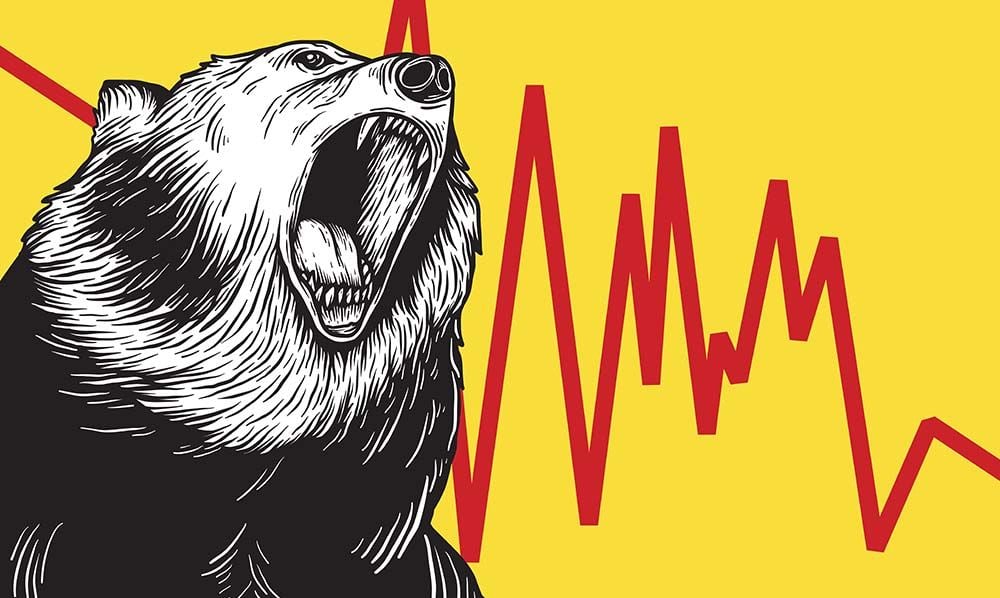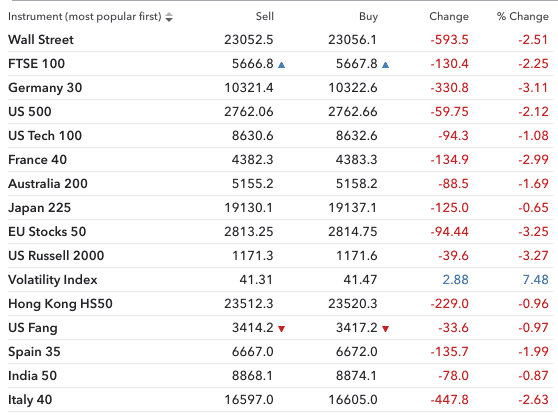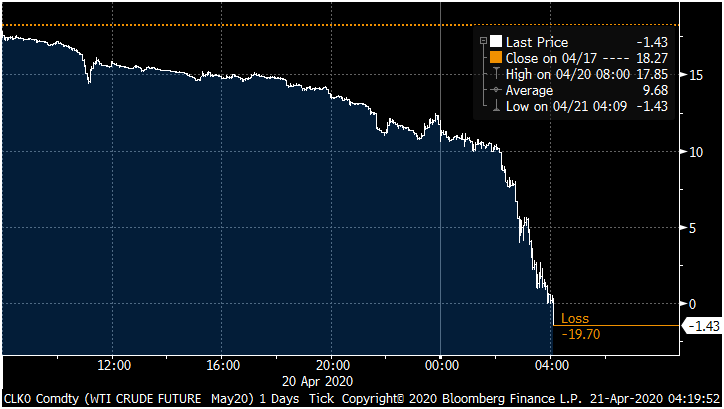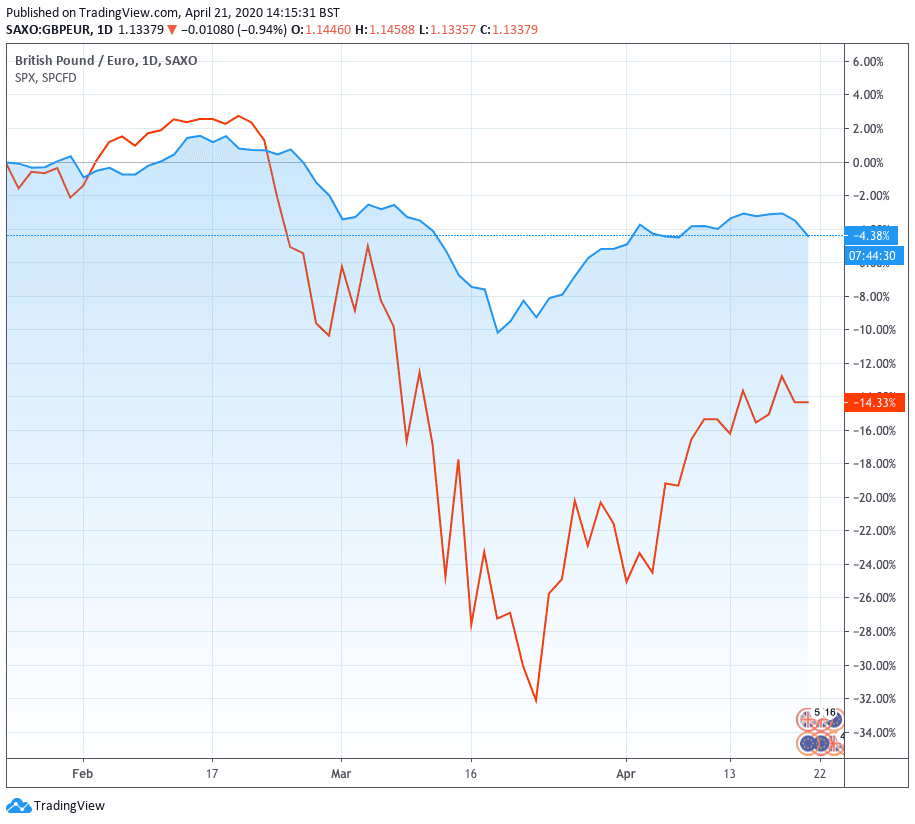Pound Sterling in Fresh Sell-Off on Bearish Turn in Global Market Conditions

Image © Adobe Images
![]() - Spot GBP/EUR rate at time of writing: 1.1340
- Spot GBP/EUR rate at time of writing: 1.1340
- Bank transfer rates (indicative): 1.1044-1.1123
- FX specialist rates (indicative): 1.1108-1.1240 >> More information![]() - Spot GBP/USD rate at time of writing: 1.2273
- Spot GBP/USD rate at time of writing: 1.2273
- Bank transfer rates (indicative): 1.1940-1.2030
- FX specialist rates (indicative): 1.2027-1.2160 >> More information
The British Pound experienced heavy selling against the Euro and U.S. Dollar on Tuesday amidst a fresh bout of global investor anxiety linked to concerns over the trajectory of the global economy, with a crash in oil prices being cited as a catalyst to the latest decline.
The FTSE 100 was seen trading 2.0% in the red while the S&P 500 index was 2.0% lower and the Dow Jones index down 2.50%.
Remarkably, the spot price of West Texas Intermediate (WTI - the U.S. crude benchmark) was down 27% at $14.90 a barrel), while Brent crude (the north sea to which two-thirds of global oil is priced) was down 17% at $23.27 a barrel.
“The Pound lost its footing on Tuesday as it found itself fighting for the wooden spoon with the New Zealand dollar as the worst performing major currency. The Pound broke through the 1.23 handle against the U.S. Dollar for the first time since 8th April as investors flocked to it as a safe haven as oil prices plunged. Just this morning I spoke with an oil broker extremely worried about the future and direction of the industry - a lot is up in the air but we can expect that over the coming days, the U.S. Dollar will consistently outperform its major counterparts,” says Sebastien Clements, currency analyst at OFX.
Global oil market prices crashed on Tuesday, with both Brent and WTI crude prices falling by close on 10% as the plummet that was restricted to the WTI May contract eventually burnt through the rest of the market.
"The U.S. Dollar is strengthening and FX markets are taking note of today’s crude oil price falls, which unlike yesterday’s collapse in the May WTI contract have not been confined to the front of the oil futures curve. With contracts as late as September or beyond collapsing today and the Brent benchmark also falling, it’s clear that although delivery and roll related quirks of the WTI market drove yesterday’s trip into negative prices, the fundamental driver of low oil prices is profound oversupply," says Ranko Berich, Head of Market Analysis at Monex Europe.
Above: On Monday the WTi crude contract for May went negative, an unprecedented financial event. Image courtesy of Jonathan Pain, Bloomberg
Oil price dynamics matter for investors as the global financial system can no longer rely on stock markets to accurately price developments in the economy, thanks to the debasing effect of central bank policy.
Demand for oil cannot be fiddled by central bank policy and therefore with WTI's May contract collapsing deep into negative territory the message is clear: markets might be misplacing the scale of the current economic slowdown and some catch-up is in order.
Therefore, oil has the ability to send signals to investors and this is in turn feeding back into Pound Sterling valuations as the currency tends to decline when global investor sentiment is negative.
The Pound has exhibited a clear link to global investor sentiment during the coronacrisis, falling against the Euro, Dollar, Yen and Swiss franc when markets are falling. It meanwhile tends to rise against 'riskier' currencies such as the Australian and New Zealand Dollars during such episodes.
Above: The GBP/EUR and S&P 500 (orange line) have tended to trend together since the advent of the coronacrisis
The Pound-to-Euro exchange rate fell a percent on the sharp move lower in global markets on Tuesday to quote at 1.1340 while the Pound-to-Dollar exchange rate fell 1.33% to read at 1.2277.
The UK is a relatively small open economy that runs a sizeable current account deficit owing to its tendency to import more than it exports. It is also an attractive investment destination for foreign capital, meaning that when the global economy is in expansion mode the Pound tends to appreciate notably on foreign investment inflows.
However, when sentiment shifts - as it has done during the coronacrisis - those supportive inflows not only tend to stop, but they tend to reverse.

Image courtesy of IG
The City of London is key to these dynamics as it is arguably the world's most systematically significant financial centre, particularly owing to its dominance in the global foreign exchange trade. Therefore when global demand for cash rises, as is always so typical of global economic meltdowns, outflows from the City can exert considerable downside pressure on the Pound.
We would therefore expect the British Pound to remain under pressure as long as markets are showing a preference for declines, all of which is now apparently dependent on the fate of oil markets.






